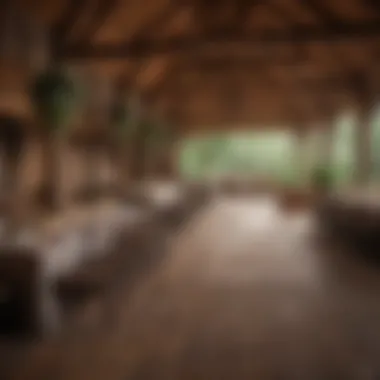Finding the Perfect Wedding Venue for 200 Guests


Intro
Selecting the right wedding venue is a crucial decision for couples. When considering a gathering of 200 guests, various factors come into play. This guide aims to simplify that process by discussing aspects such as venue type, location, budget, amenities, and services. Understanding these elements helps readers make informed decisions.
Overview of Wedding Venues
When discussing ideal wedding venues, it is important to first understand what constitutes a wedding venue. A wedding venue is a location where the ceremony and reception can take place. There are numerous types of venues. These may include hotels, banquet halls, outdoor spaces, churches, or unique locations such as museums or galleries.
Importance of Venue Selection
Choosing the right venue is vital for several reasons. It sets the tone for the event, influences guest experience, and can impact the overall budget. Selecting a venue that fits the couple’s style and needs ensures a successful celebration.
Types of Available Venues
Different types of venues cater to different tastes and functionalities:
- Banquet Halls: Typically designed for large gatherings, they often provide all necessary services.
- Hotels: Comprehensive packages are usually available, including accommodation for guests.
- Outdoor Areas: Parks and gardens offer a scenic backdrop, often at a lower cost but with more logistical needs.
- Unique Spaces: Barns, historical sites, and art galleries provide distinct atmospheres for memorable events.
Key Considerations for Venue Selection
Knowing the various options available is essential, but recognizing what to prioritize is equally important. Factors to consider include:
- Capacity: Ensure the venue can comfortably accommodate all guests.
- Location: An easily accessible venue benefits guests traveling from various areas.
- Budget: Understanding the total cost is vital to avoid financial strains.
- Amenities: Consider what services, such as catering or sound systems, are included.
- Ambiance: The venue should align with the couple’s vision and theme.
Ending
By taking these considerations into account, couples will have a clearer framework to select their wedding venue. A thoughtful approach promises a more seamless planning experience and a significantly enhanced atmosphere on the big day.
Intro
Selecting the ideal wedding venue for approximately 200 guests is a crucial aspect of organizing a successful wedding. The venue sets the tone for the entire event and impacts the guest experience significantly. It is not just about aesthetics; practical considerations must also play a role.
First, understanding the types of venues available is essential. These venues vary widely in ambiance, capacity, and services offered. For a guest list of this size, you must seek a space that comfortably accommodates everyone while providing amenities that enhance the experience. Additionally, a venue’s location can affect accessibility and guest satisfaction. You want everyone to be able to attend without undue hassle.
This topic has multiple dimensions. Budget constraints demand careful planning and evaluation of costs associated with different venues. Hidden fees can emerge, so leaving no stone unturned is vital. Understanding the essential amenities is another important factor. For example, catering capabilities, restroom facilities, and parking options are primary considerations. Each element contributes to the overall success of the event.
By thoroughly examining these factors, individuals can make informed decisions. The right venue can transform a wedding from a simple gathering into a memorable celebration. This article exists to guide you through the complexities and nuances of selecting a wedding venue that aligns with your vision and requirements.
Understanding the Requirements for Wedding Venues
Selecting the right wedding venue is not just a matter of aesthetics; it is about fulfilling the specific needs of the event and the guests. Understanding the requirements for wedding venues sets the foundation for a successful celebration. This section emphasizes the crucial aspects that affect venue selection, enabling couples to make informed decisions.
Determining Guest Count
The guest count is the first factor that couples should determine. Knowing how many people will attend the wedding helps narrow down venue choices early in the process. Different venues have varying capacities, and not every place will be suitable for 200 guests. It is essential to create a preliminary guest list to establish numbers accurately. This preliminary list can prevent unexpected surprises during the planning phase.
Additionally, understanding guest count can also influence other aspects of the wedding, such as catering and seating arrangements. It allows couples to envision the space and decide how it will accommodate guests comfortably.
Identifying Venue Capacity
After determining the guest count, the next step is focused on identifying the capacity of potential venues. Each venue has a maximum limit concerning how many guests it can service comfortably. Venues that are undersized can make guests feel cramped, detracting from the overall experience.
When researching local venues, couples should pay attention to listed capacities. Choosing a venue that is slightly larger than the guest count allows for flexibility in seating arrangements and decor. Capacity also influences access to required amenities — ensure that dining, dance floors, or other setups do not compromise comfort.
Essential Amenities and Services
Aside from capacity, it is vital to consider essential amenities and services offered by the venue. Every wedding has its unique needs, be it for sound equipment, lighting, or even restrooms. Couples should look for venues that provide comprehensive packages to streamline planning.
Here are some key amenities to consider:


- Catering Services: Some venues offer in-house catering, while others allow external catering.
- Audio/Visual Equipment: Ensure the venue has necessary equipment for speeches and entertainment.
- Parking Facilities: Convenient parking can greatly enhance guest experience.
- Restroom Access: Adequate bathroom facilities are essential for guest comfort, particularly for larger gatherings.
- Decor Items: Some venues provide basic decor like lighting and table settings, which can be helpful.
Focusing on these elements will help couples identify venues that align with their wedding vision, ensuring a memorable experience for everyone involved.
Types of Wedding Venues
Selecting the right wedding venue is crucial for any couple planning a ceremony for approximately 200 guests. The venue serves as the backdrop for the entire event; it shapes the atmosphere, influences guest comfort, and can significantly impact the overall experience. Understanding the types of wedding venues available allows couples to align their vision with practical considerations like space, amenities, and budget. Each type comes with its own unique benefits and considerations.
Banquet Halls
Banquet halls are designed specifically for events like weddings. They typically offer ample space, allowing for a variety of seating arrangements. These venues often come with necessary amenities such as tables, chairs, and basic decoration, simplifying planning efforts. One major advantage of banquet halls is that they accommodate large groups comfortably, often with capacity well above 200. Furthermore, they may provide in-house catering, ensuring a cohesive dining experience.
However, it is vital to assess whether a particular hall suits your style. While some banquet halls exude elegance, others may appear more utilitarian. Therefore, visit several options to visualize how your wedding would fit within those spaces.
Outdoor Locations
Outdoor venues offer a distinct ambiance that often connects guests with nature. Gardens, vineyards, or beachfront locations can create a romantic and picturesque setting. Choosing an outdoor venue allows for diverse possibilities in terms of decor and layout.
That said, outdoor locations can present challenges, primarily concerning weather. It is wise to have a backup plan or event tent, particularly if your big day falls during unpredictable seasons. Additionally, some outdoor venues may lack facilities, so consider lighting, seating, and restroom access.
Historical Sites
Historical sites possess inherent charm and character, making them appealing for couples who value rich history. A vintage mansion or a heritage building can provide a distinct and memorable atmosphere for ceremonies and receptions alike.
While these sites can be visually stunning, they may have restrictions. For example, some places might limit decorations, sound levels, or catering options to preserve their integrity. It is important to discuss any limitations with venue coordinators beforehand to ensure that your preferences are respected.
Hotels and Resorts
Hotels and resorts typically provide comprehensive services for wedding planning. They can accommodate guests on-site, simplifying travel logistics. Many have packages that include catering, décor, and event planning assistance, which can help reduce stress during the planning stage.
However, selecting a hotel venue can have implications on cost and exclusivity. Some might charge premium prices, especially during peak wedding seasons. Understanding the overall package inclusions is essential when budgeting for your event.
Unique Venues
Choosing a unique venue helps create a distinctive event that stands out in guests' memories. These can range from art galleries to warehouses or even barns. Each unique venue provides its own ambience and layout, allowing creative freedom for decorations and setups.
Yet, with unique venues can come potential challenges, such as lack of familiarity or insufficient facilities. Ensure to consider how accessible these venues are for your guests, and whether they include essentials like restrooms and power supply for audio-visual needs.
The type of wedding venue chosen significantly affects not only aesthetics but also guest experience, budget, and logistical planning. Taking the time to explore each type and understand its pros and cons is vital for successful wedding execution.
Identifying Local Wedding Venues
Identifying local wedding venues is a crucial part of the planning process. When considering a wedding for around 200 guests, proximity and venue options play significant roles. Being aware of local venues allows couples to assess the suitability based on availability, amenities, and guest convenience.
Thinking locally often leads to easier logistics. Guests will appreciate not having to travel far, which can enhance attendance rates. Additionally, local venues might offer unique settings that reflect the character of the area, providing beautiful backdrops for photographs.
Moreover, local wedding venues may harbor community connections. Establishing relationships with venue managers and coordinators can facilitate smoother negotiations and personalized service. Every venue has its unique features and style that can influence the overall theme of a wedding.
Online Venue Directories
Online venue directories serve as a valuable resource. Websites like WeddingWire and The Knot maintain extensive listings of wedding venues by region. These platforms allow users to filter based on specific criteria like capacity, amenities, and pricing.
The benefit of utilizing these directories includes not just access to multiple options but also insights into real customer reviews. This transparency can help couples make informed decisions. Look for venues that consistently receive high ratings and positive feedback from previous clients.
Social Media Platforms
Social media platforms can enhance the search process significantly. Websites like Facebook and Instagram showcase venues in a visual format. Couples can view photos, testimonials, and even videos that portray the atmosphere and services offered by different locations.
Furthermore, social media enables direct engagement. Many venues actively respond to inquiries and share updates about special offers or open house events. Couples can also discover trending venues, which are popular among other engaged couples in the area, providing options that align with current preferences.
Word-of-Mouth Recommendations


Word-of-mouth recommendations remain one of the most effective ways to identify potential wedding venues. Engaging with friends, family, and colleagues who have recently married can yield insightful information. Personal experiences can shed light on not just the locations but also the services offered and the overall vibe.
Consider joining local wedding groups on platforms like Reddit or Facebook. These communities share their experiences, advice, and suggestions on various venues.
To summarize, identifying local wedding venues requires leveraging online directories, utilizing social media, and tapping into personal recommendations. This combination ensures that couples can thoroughly explore their options and choose the venue that best fits their vision for their special day.
Evaluating Venue Options
Evaluating venue options is a critical phase in the process of selecting an ideal wedding venue for 200 guests. It allows couples to scrutinize possible locations, ensuring that each potential venue aligns with their overall vision for the wedding. This evaluation provides insight into the practicality and suitability of different spaces. Such thorough examination plays a necessary role in making an informed choice. Choosing without due diligence can result in unexpected disappointments, impacting the overall experience of the event.
Site Visits and Inspections
Site visits and inspections are essential for assessing a wedding venue. Simply viewing pictures or reading descriptions online is not always enough. Visiting the location in person gives couples a tangible sense of the space. They can visualize layouts, check the flow of the area, and even gauge the atmosphere. During a site visit, paying attention to details is crucial: how does the venue smell, what is the level of cleanliness, and how do the staff members engage with visitors? Notably, viewing the venue at the time of a wedding event can provide insights about seating arrangements, decorations, and logistics. Couples should also inquire about compatibility with their requirements, ensuring that the venue can accommodate 200 guests comfortably.
Comparing Costs and Packages
Comparing costs and packages can save significant time and resources for couples. Different venues have varied pricing structures that may include everything from pricing for rental, food, and decorations to hidden fees that may arise later. It is essential to obtain detailed information about what each package entails and whether any additional costs apply. Often, venues offer package deals that sound appealing. Yet, couples should analyze the inclusions carefully. For example, some packages seem affordable but may skimp on vital elements like catering or service fees. Reviewing all options allows couples to find a venue that fits within their budget while meeting their needs effectively.
Assessing Accessibility and Location
When assessing accessibility and location of a venue, convenience for guests is key. A venue that is easy to reach can positively affect attendance and overall experience. Couples should consider factors like the proximity to transport options, availability of parking, and ease of navigating to the venue. An ideal location serves as a backdrop to the event while remaining accessible. If a venue is too remote, it may deter guests from attending, regardless of its aesthetic charm. Couples are encouraged to visit locations at varying times to understand traffic patterns and evaluate comfort for all attending.
"A venue should be beautiful and practical, ensuring all guests feel welcomed and engaged. Any overlook on accessibility can lead to logistic nightmares on the big day."
Important Considerations
Selecting an ideal wedding venue for 200 guests requires a thorough understanding of various important considerations. These factors can significantly affect not just the selection process but also the overall experience of the day itself. Careful deliberation over elements such as seasonal factors, weather contingencies, and parking options will ensure that the chosen venue meets both aesthetic and functional needs for the event.
Seasonal Factors
Understanding seasonal factors is crucial when choosing a venue. Different seasons bring unique characteristics that can influence the atmosphere of a wedding. Spring is characterized by fresh blooms and mild weather, making it ideal for outdoor ceremonies. Summer offers longer days, but high temperatures might necessitate considerations for shade and cool areas. Fall brings vibrant colors and cooler evenings suitable for picturesque events. Winter, while often associated with cold, can create intimate settings with warmth from fireplaces.
Assessing these factors in the context of venue options allows couples to better align their preferences with available local sites. For example, a picturesque garden venue in spring or an elegant indoor space in winter could harmonize with the chosen aesthetics for the day.
Weather Contingencies
Weather contingencies are a significant concern, especially for outdoor weddings. Even with seasonal awareness, weather can be unpredictable. This is why it’s important to have a clear plan in place. Firstly, ensure that potential venues offer an adequate indoor space in case of rain, wind, or extreme temperature changes. Secondly, consider equipment for heating or cooling, such as heaters or fans, which could enhance comfort during the event.
A backup plan doesn’t just protect the day, but also gives peace of mind to the couple and their families. Consulting weather forecasts as the date approaches can provide insights about any potential challenges. Be proactive in discussing these scenarios with your venue managers to create a strategic contingency plan that suits all parties involved.
Parking and Transportation
Parking and transportation options are among the logistical aspects that require special attention. A venue that offers ample parking space or has nearby parking facilities will significantly enhance guests’ experiences. It can remove stress related to finding a spot close to the venue.
Additionally, think about transportation options for guests who may not drive. If the venue is in a location that’s difficult to access, consider arranging shuttle services from central points such as hotels or public transport hubs. This consideration fosters an inclusive environment and allows all guests to enjoy the day freely, without the hassle of commuting.
Always think ahead about locations. The details matter, and they can enhance or detract from the day you’ve planned.
Focusing on these major considerations enhances the likelihood of a smooth and memorable wedding day. With careful planning around seasonal aspects, expectations about weather, and transportation/logistical needs, you’re likely to create an event that is both seamless and enjoyable for you and your guests.
Budgeting for Your Venue
Budgeting is a critical aspect when selecting a wedding venue for 200 guests. It plays a vital role in ensuring that you stay within financial limits while still achieving your desired outcome. Spending wisely not only alleviates stress but also enhances the overall experience of your special day. Proper budgeting allows you to prioritize features that matter and helps in narrowing down your choices effectively.
Understanding Costs
Understanding costs involves breaking down all components related to the venue. Several factors contribute to the total expenditure, including:
- Rental Fee: This is the base cost for using the venue and can vary widely depending on the location and amenities offered.
- Catering Costs: Almost always the largest chunk in your budget. This encompasses food, beverages, and service staff.
- Setup and Cleanup Costs: Some venues charge additional fees for setting up the space and cleaning afterward.
- Decorations and Rentals: Items such as tables, chairs, and linens should be accounted for, either through the venue or as rentals from external suppliers.


By understanding these costs upfront, you can avoid surprises as the planning progresses. Make sure to request detailed quotes from the venues you are considering to get a clearer picture of the expected costs.
Hidden Fees to Consider
While budgeting, it is equally important to identify hidden fees that can quickly inflate your expenditure. Some common hidden fees include:
- Service Charges: A percentage fee added to catering or bar services that is often overlooked.
- Gratuity Fees: Remember to consider gratuities for service personnel, as this is a customary expense not always included in initial quotes.
- Cancellation Fees: Understand the terms concerning cancellations as some venues impose high fees for changes.
- Overtime Charges: If your event runs longer than agreed, many venues may impose additional fees.
"Budgeting accurately can save you from potential financial pitfalls that can arise unexpectedly."
Being aware of these additional costs will enable you to create a more accurate budget. Always inquire about any potential fees when negotiating with the venue.
Negotiating with Vendors
Once you have a solid understanding of costs, the next step is negotiation. Many venues have some flexibility in their pricing. Here are a few tips for effective negotiation:
- Do Your Research: Know the average costs in your area for similar venues so you can negotiate from a position of understanding.
- Be Clear About Your Budget: Communicate your budget to the venue to explore any options they may have.
- Ask for Package Deals: Many venues offer packages that can include essential services at a lower total cost than booking separately.
- Be Open to Off-Peak Dates: If you can be flexible with your date, some venues may offer significant discounts during less popular seasons or days of the week.
Negotiation is an art that requires confidence and clarity. Having a well-defined budget along with flexibility can lead to a better deal.
Overall, taking a structured approach to budgeting for your wedding venue can lead to both financial and emotional relief, allowing you to focus on celebrating your special occasion.
Finalizing Your Venue Choice
Selecting the right wedding venue is a significant decision in the planning process. The venue sets the tone for the entire event and impacts various aspects of the wedding day. By finalizing your venue choice, you solidify a cornerstone of your celebration. It involves careful consideration of multiple factors including contracts, deposits, and potential backup plans, ensuring that every detail aligns with your vision and requirements.
Reviewing Contracts and Agreements
When you have narrowed down your venue options, it is essential to review contracts and agreements thoroughly. These documents outline details like rental fees, payment schedules, and cancellation policies. Understanding these terms can prevent future misunderstandings and ensure that you are fully aware of your obligations.
Key elements to focus on include:
- Payment Terms: Ensure you know when payments are due.
- Cancellation and Rescheduling Policies: Understand any penalties involved if plans change.
- Liability Clauses: Be aware of coverage for damages or unforeseen events.
- Venue Restrictions: Check for rules regarding decorations, noise levels, and outside vendors.
Taking time to discuss any unclear points with the venue manager can save you from future issues. A well-understood contract is a big step toward a successful wedding.
Making a Deposit
After reviewing the contract and agreeing to terms, the next step is making a deposit. This shows your commitment to the venue and secures your date. The deposit amount can vary widely based on venue policies.
Consider the following:
- Deposit Amount: Know how much you need to pay and whether it is a fixed fee or a percentage of the total cost.
- Payment Methods: Confirm which forms of payment are accepted.
- Refund Policy: Understand whether the deposit is refundable if you need to cancel or change your venue.
By ensuring a clear understanding of the deposit process, you can secure your chosen venue confidently.
Planning Backup Options
Even with careful planning, circumstances can change suddenly. Therefore, it is prudent to have backup options in place. Having alternative venues or plans can provide peace of mind.
Here are some strategies:
- Alternative Venue: Identify other suitable venues in case your first choice becomes unavailable.
- Date Flexibility: Consider choosing a date that allows for easy rescheduling if necessary.
- Weather Plans: For outdoor venues, have a clear contingency plan in case of poor weather.
Planning backup options can mitigate stress, ensuring that your wedding day unfolds smoothly. It is an often overlooked step, but one that provides significant reassurance.
Finalizing your venue choice is not just a matter of picking a place. It involves understanding and addressing many logistical aspects that can impact your day.
End
Selecting a venue is not merely about aesthetics; it also encompasses logistical elements such as guest comfort, availability of services, and compliance with local regulations. As a couple, evaluating these aspects ensures that the chosen venue can accommodate both your needs and desires, creating a seamless environment for your celebration.
The importance of conducting thorough research cannot be overstated. Visiting venues, comparing options, and seeking recommendations from friends and family can provide valuable insights. Additionally, paying attention to small details such as parking availability and transportation options for guests can significantly influence overall satisfaction on the wedding day.
Moreover, understanding the financial implications involved in venue selection, including potential hidden costs and expenses related to services, is critical. This knowledge empowers couples to negotiate better and align their choices with their wedding budget.
Ultimately, choosing the right venue is a pivotal step in forming unforgettable memories for you and your guests. By considering all the discussed elements, you can confidently make a decision. Being aware of various factors and taking the time to plan ensures that your wedding will be an occasion to remember, tailored precisely to your preferences and needs.















